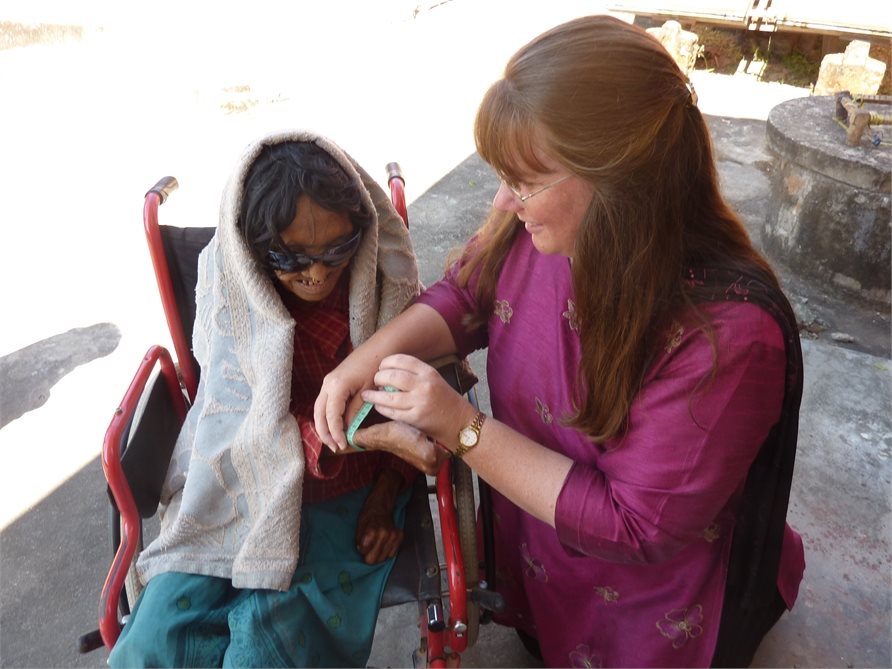
Bringing Light Into the Darkest Places 5 Sep 12
“God opposes the proud but shows favour to the humble.” James 4:6
Dr Julie was called to bring light into the darkest places. Originally from Tauranga, Julie has been based in Nepal for the past seven years, touching and restoring the lives of leprosy-affected people and others who need medical care. It all started by reading Dr Paul Brand’s books at the age of 17.
While Julie was in New Zealand in July this year, she visited the Leprosy Mission New Zealand office to update the team on her work. LMNZ provides financial support for Julie’s work with leprosy-affected people in Nepal.
Julie shared with us a touching story about a woman she met called Belmati: Can you imagine sending your 70 year old grandmother to live in a one room shack in the jungle?
That’s what happened to Belmati who for years had lived peacefully with her married daughter’s family in a remote mountain village. Thirteen years ago she noticed numbness in her hands and feet. Later she developed wounds and ulcers on her hands, but because she was poor and they didn’t hurt she didn’t get any treatment and slowly her fingers shortened until her right hand became a fingerless stump. The fingers on her left hand bent into a claw shape. She couldn’t lift her feet to walk properly and then developed problems with closing her eyes and seeing properly.
Belmati’s neighbours spread the word that she had leprosy, and before long the whole family was ostracised and no one would speak to or visit them. The neighbours put pressure on Belmati’s family to remove her from the home. As a result, her son-in law sent her to a shack in the jungle and made her live there alone. Grandchildren left food outside the shack for her 6 times a week, but nobody talked to her. She became malnourished, her weight dropping to just 24 kilos. The shack leaked and was overrun by rats inside, while wild animals prowled around outside. Because of her deformity she couldn’t care for herself properly and only managed to wash herself about once a year. She dragged herself into the jungle to go to the toilet. Belmati felt rejected and despised and often wished she would die.
Our project found out about her from a newspaper story and sent our social worker to find her. Her shack was 90 minutes walk to the nearest road. Our social worker couldn’t carry her that far by himself and no one from her village was willing to help. He persuaded a man from a nearby village to help him carry Belmati – and had to pay the equivalent of three weeks’ salary for the 90 minute trip before he would agree. From there he brought her by bus to our leprosy centre.
When she arrived she had a towel over her face and wouldn’t let anyone take it away as she was too ashamed to be seen. After a few hours she was willing for us to see her face. Our staff were able to wash and feed her and provide her with clean clothes. I examined her and treated her leprosy, multiple other infections and malnutrition. Once these were under control, I referred her to the big hospital in Pokhara for surgery for her uterine prolapse and eye problems.

While she was in Pokhara, our staff visited her village several times talking with her family and neighbours about leprosy, what caused it, that she was getting treatment and was not infectious or a danger to anyone. The neighbours agreed to let her back into the village. Her family agreed to add a room onto their house for her to live in and our project helped them build a toilet she could easily use.
Belmati’s life has been transformed and she now has hope for the future. Unfortunately, even today, Belmati’s story is not unusual. In rural Nepal people affected by leprosy are often treated as outcasts from society. People believe their disease is due to a curse, the anger of the gods or simply a result of their bad actions in a previous life. Either way, people avoid them and even government health staff hesitate to treat them. Leprosy sufferers are still abandoned and cast out by their parents, spouses or children. Some children affected by leprosy are not allowed to attend school; adults often lose their marriages or their jobs.
